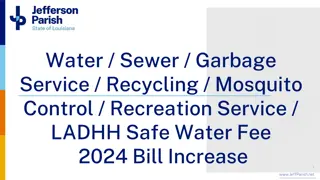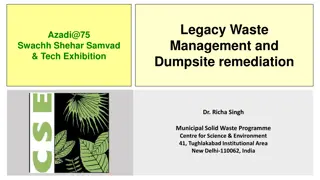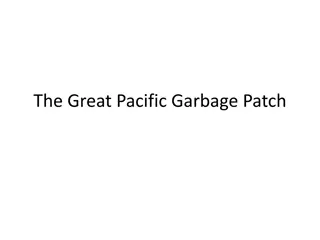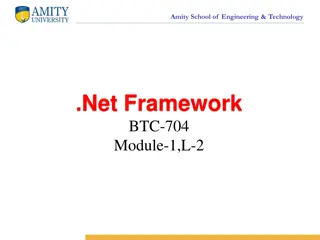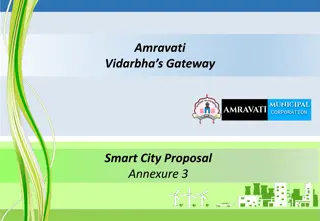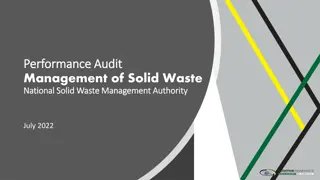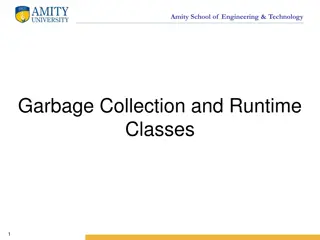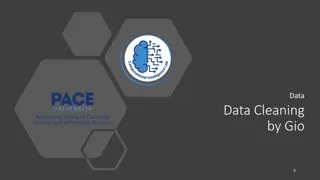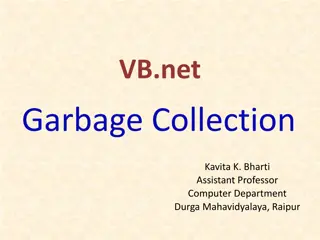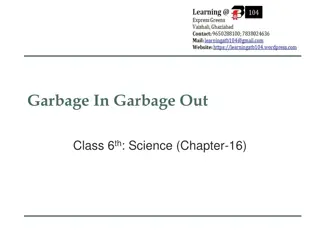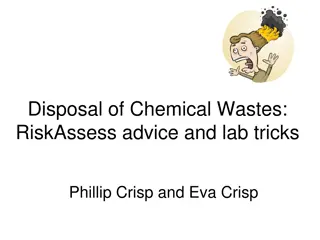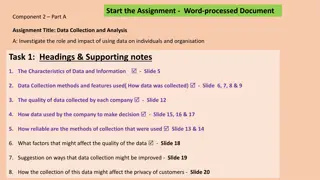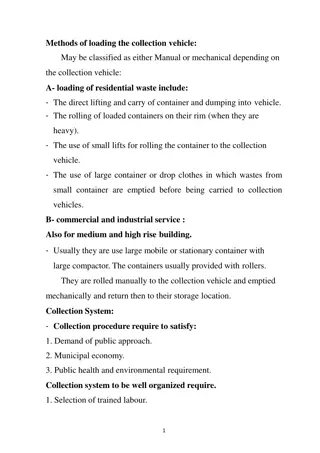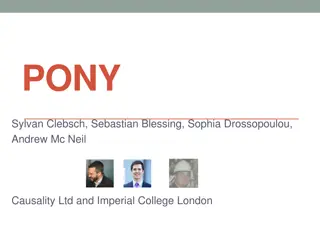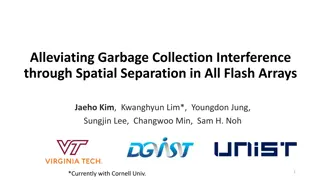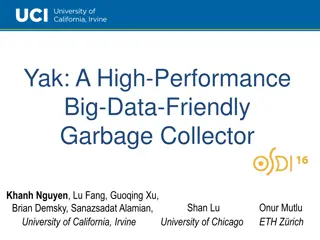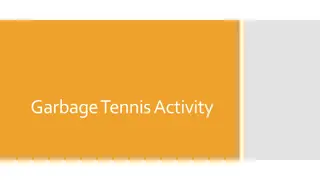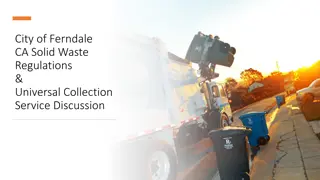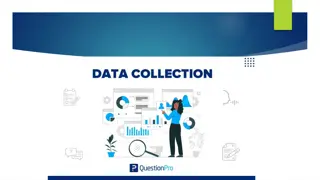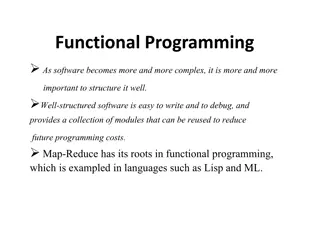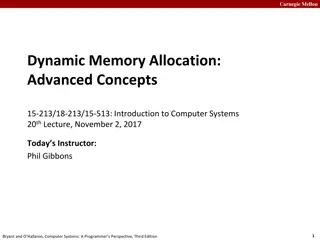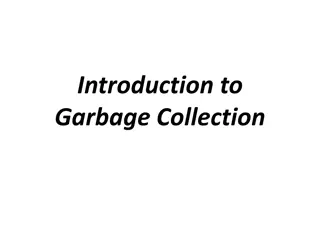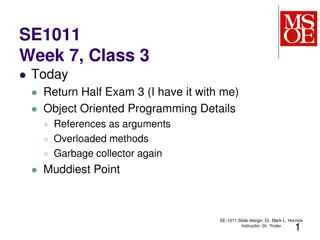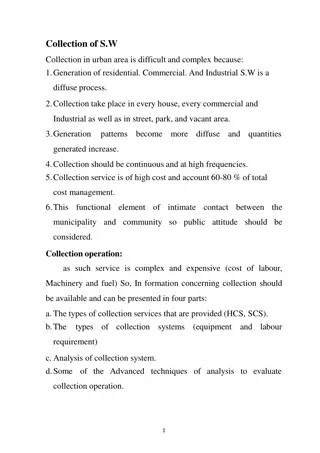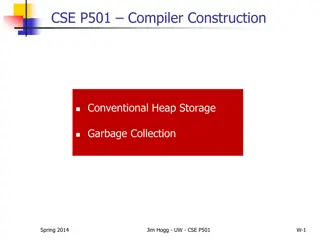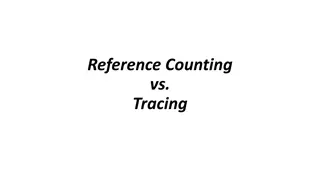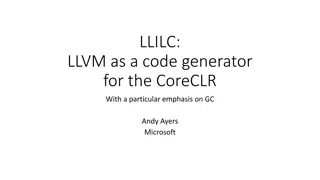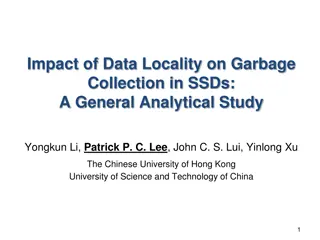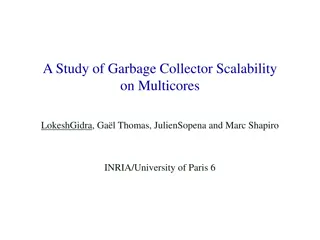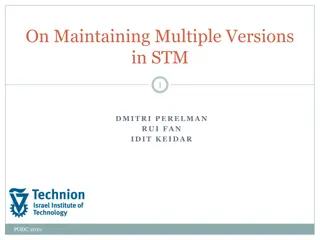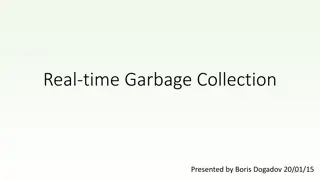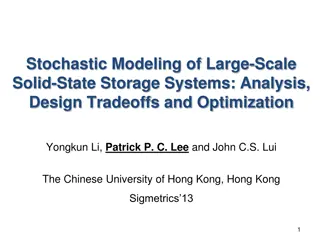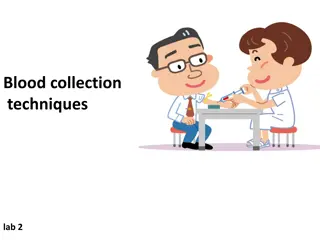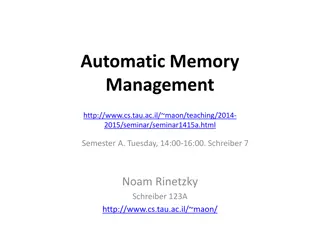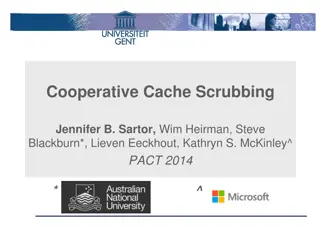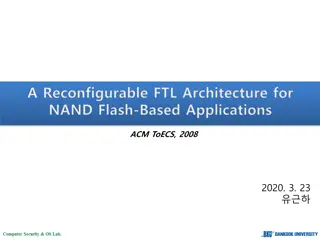Jefferson Parish Water and Utility Services Update for 2024
Discover the latest information on water, sewer, garbage collection, recycling, mosquito control, and recreation services in Jefferson Parish for 2024. Get insights into the bill breakdown, rate increases, average monthly residential service costs, and projected water volume consumption costs. Stay
3 views • 9 slides
Joint Meeting Public Hearing: Annexations in Orchard Park
The Joint Meeting Public Hearing in Orchard Park discusses the annexation of 130 parcels, aiming to charge all residents for services uniformly. The process addresses boundary issues between the Town and Village, with a focus on streamlining services like garbage collection, water systems, and road
2 views • 6 slides
Challenges and Solutions in Legacy Waste Management and Dumpsite Remediation in India
Legacy waste and dumpsites in India pose significant environmental and health hazards due to mismanagement over decades. The presentation highlights current status, composition of waste fractions, remediation approaches like bio-capping and biomining, challenges faced, and the role of initiatives li
0 views • 22 slides
The Great Pacific Garbage Patch - A Looming Environmental Crisis
The Great Pacific Garbage Patch is a massive collection of marine debris in the North Pacific Ocean, consisting mainly of non-biodegradable plastics that break down into harmful microplastics. This environmental issue, discovered by Captain Charles Moore, underscores the global problem of ocean poll
0 views • 12 slides
Overview of .NET Framework and CLR Architecture at Amity School of Engineering
Explore the .NET Framework and Common Language Runtime (CLR) architecture at Amity School of Engineering & Technology, covering topics such as .NET components, technical architecture, common language runtime, CLR execution model, and more. Discover the support for multiple languages and the .NET lan
0 views • 28 slides
Amravati Smart City Proposal Overview
City Profile includes details on transportation, water supply, solid waste management, energy, housing, and digital initiatives undertaken by Amravati Municipal Corporation in their Smart City Proposal. Citizen Engagement section outlines campaigns and events to involve diverse groups in the develop
0 views • 25 slides
Performance Audit of Solid Waste Management: Challenges and Recommendations
In Jamaica, the National Solid Waste Management Authority (NSWMA) is facing issues with ineffective waste management, leading to environmental and public health concerns. Delays in garbage collection, non-compliance with regulations, and lack of strategic planning have impacted NSWMA's effectiveness
0 views • 12 slides
Understanding Garbage Collection in Java Programming
Garbage collection in Java automates the process of managing memory allocation and deallocation, ensuring efficient memory usage and preventing memory leaks and out-of-memory errors. By automatically identifying and removing unused objects from the heap memory, the garbage collector frees up memory
14 views • 22 slides
Comprehensive Guide to Data Cleaning and Preprocessing Techniques
Understanding the crucial concepts of data cleaning such as Garbage In, Garbage Out principle (GIGO), Non-Linear and Geographic data inspection, handling NaN values, feature scaling, PCA, correlations, and more. Explore the steps involved in cleaning and preprocessing data for data science and machi
0 views • 12 slides
Understanding Garbage Collection in VB.net
Garbage collection in VB.net is a process of releasing memory from unused objects and components of the application. It is implemented as a separate thread in the .NET framework with automatic memory management. The process ensures efficient memory allocation, reclaiming of unused objects, and maint
0 views • 8 slides
Managing Garbage: A Comprehensive Overview for Class 6 Science
This educational material delves into the science of garbage management, covering topics such as types of garbage, how to deal with garbage, components of garbage, recycling, composting, vermicomposting, and the impact of plastics on the environment and health. It emphasizes the importance of proper
0 views • 14 slides
Proper Chemical Waste Disposal: Advice and Best Practices
Learn how to safely dispose of chemical wastes in compliance with local regulations. Follow expert advice on waste collection, avoid sewer and garbage disposal, and prioritize safety to minimize environmental harm. Training on responsible disposal practices is essential for creating a culture of sus
0 views • 18 slides
Understanding Data Collection and Analysis for Businesses
Explore the impact and role of data utilization in organizations through the investigation of data collection methods, data quality, decision-making processes, reliability of collection methods, factors affecting data quality, and privacy considerations. Two scenarios are presented: data collection
1 views • 24 slides
Waste Collection Systems Overview and Best Practices
Waste collection systems can be classified as manual or mechanical based on the type of collection vehicle used. Residential waste loading methods include direct lifting, rolling of containers, and use of lifts. Commercial and industrial services typically utilize large mobile or stationary containe
0 views • 7 slides
A Deep Dive into the Pony Programming Language's Concurrency Model
The Pony programming language is designed for high-performance concurrent programming, boasting speed, ease of learning and use, data race prevention, and atomicity. It outperforms heavily optimized MPI versions in benchmarks related to random memory updates and actor creation. With an API adopted f
0 views • 33 slides
Flash Array Storage Infrastructure and SSD Performance
The article discusses alleviating garbage collection interference in flash arrays and the importance of spatial separation. It also covers the concept of All Flash Arrays (AFA) and provides examples of AFA products and SSDs for enterprise use. Furthermore, it explores bandwidth trends for network an
0 views • 29 slides
Improving Big Data Performance with Yak: A Hybrid Garbage Collector
Explore how Yak, a hybrid garbage collector, addresses challenges in managing memory for big data applications. Developed by a team of researchers, Yak is a high-performance solution that integrates generational garbage collection with region-based memory management, reducing costs and enhancing eff
0 views • 20 slides
Reflecting on a Unique Garbage Tennis Activity
Engage in a Garbage Tennis Activity where students progress through challenging rounds, aiming to make baskets in a garbage can. Each round introduces new obstacles, like a wall or blindfolding, fostering teamwork and adaptability. Reflect on goal-setting, short-term victories, and the value of supp
0 views • 19 slides
Overview of Ferndale, CA Solid Waste Regulations & Universal Collection Service
This content provides an overview of the solid waste regulations and universal collection service discussion in Ferndale, CA. It covers topics such as the need for universal collection, a solid waste franchise agreement, proposed service changes, regulatory drivers, and jurisdiction responsibilities
0 views • 14 slides
Understanding Data Collection Methods for Business Analysis
Data collection is essential for analyzing business performance and making informed decisions. Various data collection methods like primary and secondary data collection help evaluate outcomes and draw conclusions. Primary data includes raw information obtained firsthand, while quantitative methods
0 views • 15 slides
Understanding Functional Programming Paradigm
Functional programming emphasizes well-structured software that is easy to write and debug, with reusable modules to reduce future programming costs. It introduces higher-order functions and first-class function values, fostering declarative programming for tasks like symbolic data manipulation and
0 views • 21 slides
Overview of WEEE Collection in Baltic States
This presentation explores the WEEE (Waste Electrical and Electronic Equipment) collection practices in Estonia, Latvia, and Lithuania. It covers the targets set by the WEEE directive 2012/19/EU, the setup of collection systems, and the results achieved. The content delves into the minimum collectio
0 views • 19 slides
Reviving Reference Counting: A Comprehensive Analysis
Background garbage collection techniques like tracing and reference counting are crucial in managing memory in different settings. This article delves into the historical context, advantages, disadvantages, and challenges of reference counting in garbage collection. It presents an in-depth analysis
0 views • 35 slides
Understanding Dynamic Memory Allocation in Computer Systems
Dynamic memory allocation in computer systems involves the use of memory allocators like malloc to acquire virtual memory at runtime for data structures whose size is only known during execution. Different methods such as implicit lists and explicit lists are used to keep track of free blocks for ef
0 views • 62 slides
Understanding Garbage Collection in Programming
Garbage collection automates memory reclamation, freeing programmers from manual memory deallocation tasks. This process enhances program reliability, reduces errors, and decouples memory management from other software engineering concerns. Originating in LISP in 1960, garbage collection has become
0 views • 25 slides
Object-Oriented Programming Details: References, Overloaded Methods, and Garbage Collector
Today in class, we covered returning half of Exam 3, focusing on object-oriented programming intricacies such as passing references as arguments, overloaded methods, and the role of the garbage collector. Modifications to lab requirements were discussed to ensure comprehensive use of implemented met
0 views • 15 slides
Challenges and Strategies in Solid Waste Collection in Urban Areas
Solid waste collection in urban areas is complex due to the diffuse nature of waste generation, varied collection locations, increased quantities of waste, high costs, and the need for continuous service. Different collection methods and systems such as curbside pick-up, alley service, set-out set-b
0 views • 5 slides
Understanding Memory Management in Programming
Memory management is a critical aspect of programming to prevent issues like memory leaks, use-after-free bugs, and memory corruption. Proper memory allocation and deallocation techniques can improve performance and avoid security vulnerabilities. Learn about heap storage, garbage collection, smart
0 views • 27 slides
Comparison of Reference Counting vs. Tracing Garbage Collection Algorithms
Understanding the differences between reference counting and tracing garbage collection algorithms, their challenges, and design spaces. Discussing topics such as storing object counts, maximum reference count distribution, overflow scenarios, and methods for maintaining counts in reference counting
0 views • 23 slides
Understanding LLILC: A Code Generator for CoreCLR with a Focus on GC
LLILC, utilizing LLVM as a code generator for CoreCLR, emphasizes Garbage Collection (GC) and offers insights on JIT compilation and pluggable Jit architecture. This open-source project provides a cross-platform capable version of the CLR and supports Portable API surface for .Net frameworks, enabli
0 views • 24 slides
Impact of Data Locality on Garbage Collection in SSDs: A General Analytical Study
SSDs, widely deployed in desktops and data centers, offer high throughput but face limitations due to garbage collection overhead. This study explores the impact of data locality on garbage collection performance in SSDs, highlighting challenges, motivation, and contributions of the research. The wo
0 views • 26 slides
Study of Garbage Collector Scalability on Multicores
This study delves into the scalability challenges faced by garbage collectors on multicore hardware. It highlights how the performance of garbage collection does not scale effectively with the increasing number of cores, leading to bottlenecks in applications. The shift from centralized to distribut
0 views • 23 slides
Exploring Multi-Versioning in STM: Challenges and Solutions
Examining the benefits and challenges of maintaining multiple versions in software transactional memory (STM) systems. Discusses the issues with aborts in STM, the advantages of multi-versioning, and the permissiveness guarantees associated with MV-STMs. Also delves into the garbage collection chall
0 views • 13 slides
Real-time Garbage Collection in Software Development
Real-time Garbage Collection (RTGC) is a crucial aspect of ensuring efficient software performance in time-constrained environments. This practice, exemplified by Boris Dogadov in a presentation, involves managing memory allocation and deallocation dynamically during program execution. The process a
0 views • 109 slides
Optimizing Tradeoffs in Large-Scale Solid-State Storage Systems
The research delves into stochastic modeling of Solid-State Storage Systems, emphasizing design tradeoffs and optimization strategies. Key aspects covered include the workings of SSDs, challenges such as wear-out, garbage collection, and tradeoff considerations between cleaning cost and wear-levelin
0 views • 24 slides
Comprehensive Guide to Blood Collection Techniques in Medical Investigations
Blood collection is a crucial process in medical investigations where blood is withdrawn from patients for analysis. Methods include arterial sampling, venipuncture, and fingerstick sampling, each serving specific purposes. Venous blood is preferred over arterial blood due to accessibility and ease
0 views • 10 slides
Understanding Automatic Memory Management in Programming
Dive into the realm of automatic memory management, exploring garbage collection algorithms, dynamic memory handling, common mistakes to avoid, potential undesired outcomes, challenges of deallocation, controlled solutions for managing memory, and the benefits of automatic memory management in simpl
0 views • 29 slides
Cooperative Cache Scrubbing for Efficient Memory Management in Multicore Systems
Cooperative Cache Scrubbing optimizes memory management in multicore systems by efficiently handling short-lived application objects and reducing unnecessary data writes to memory. By communicating semantic information to hardware caches, dead lines are scrubbed, dirty bits unset, and unnecessary fe
0 views • 40 slides
Reconfigurable FTL Architecture for NAND Flash-Based Applications
NAND Flash memory is commonly used in mobile devices due to its reliability and non-volatile nature. Flash Translation Layer (FTL) plays a crucial role in optimizing NAND flash performance and lifetime. The design of FTL should focus on hiding technological details, maximizing performance, and consi
0 views • 17 slides
Top Tips for a Smooth Garbage Disposal Installation in San Diego
Installing a garbage disposal can be a simple yet effective home improvement activity for your kitchen. With the disposal, you save your kitchen from trash while at the same time ensure proper clean-up after meals. Contact us now.\nFor more info - \n
0 views • 5 slides
